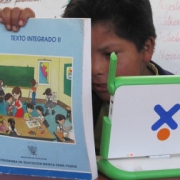Attention ICT Innovators: Have you Considered Peace Corps?
 No, I don’t actually mean you should commit to 2 years of service in the Peace Corps (though if you have the time, “life is calling” as the PC recruiters say), but what about joining forces with them? With over 9,000 volunteers, 40% of which focus on education and another 12% in business and ICT, and spanning the globe in about 76 developing countries, isn’t that a resource worth exploring?
No, I don’t actually mean you should commit to 2 years of service in the Peace Corps (though if you have the time, “life is calling” as the PC recruiters say), but what about joining forces with them? With over 9,000 volunteers, 40% of which focus on education and another 12% in business and ICT, and spanning the globe in about 76 developing countries, isn’t that a resource worth exploring?Amidst reading the numerous critical blogs and some rather heated debates, I’ve started to wonder: What on-the-ground research is being done to assess the need for some of these new innovations in a specific country in the first place? What resources, particularly people, are already available to help introduce and support the teacher training needed for local teachers to deem the technology useful and relevant within the unique cultural context?
 In Cambodia, where I recently served as a Peace Corps Volunteer at the Prey Veng Regional Teacher Training Center (RTTC), the Khmer have a saying: “Don’t take the straight or winding path. Take the path your ancestors have taken.” And new innovations in ICT can be seen as just that — a long winding path of new and confusing devices, unfamiliar to an aging population of school officials and teachers that think they have fared well enough as educators without the help of new gadgets.
In Cambodia, where I recently served as a Peace Corps Volunteer at the Prey Veng Regional Teacher Training Center (RTTC), the Khmer have a saying: “Don’t take the straight or winding path. Take the path your ancestors have taken.” And new innovations in ICT can be seen as just that — a long winding path of new and confusing devices, unfamiliar to an aging population of school officials and teachers that think they have fared well enough as educators without the help of new gadgets.
Last month, leading experts and stakeholders in the field of mobile learning discussed how people’s perceptions of mobile phones are impeding progress in mobile learning in the recently released UNESCO Mobile Learning Week report:
Perhaps due to the intellectually-light and entertainment-heavy content that has been optimized for mobile devices over the past decade, the primary social challenge is convincing people that phones are NOT a barrier to learning.
Even in American classrooms, mobile phones can often be thought of as a distraction, most commonly used for texting and watching YouTube videos, rarely ever thought of as a valuable teaching aide that teachers could already be using if they had the training or interest to explore its potential on their own.
 And mobile devices are just the tip of this growing iceberg of ICT, OER, FOSS, and a plethora of other acronyms used in this field. So once the need and appropriateness of a technology is determined useful for a particular country and educational environment, who might be able to help train teachers how to use and develop it? Who has three months of intensive language training and culture-sensitivity seminars, works and lives with the locals, has a wide range of connections within the school system, and strives to understand the complexities of the education system? That’s right — the tech-savvy Peace Corps Volunteers.
And mobile devices are just the tip of this growing iceberg of ICT, OER, FOSS, and a plethora of other acronyms used in this field. So once the need and appropriateness of a technology is determined useful for a particular country and educational environment, who might be able to help train teachers how to use and develop it? Who has three months of intensive language training and culture-sensitivity seminars, works and lives with the locals, has a wide range of connections within the school system, and strives to understand the complexities of the education system? That’s right — the tech-savvy Peace Corps Volunteers.
Now that’s an assumption and generalization that all PCVs know and care about what’s going on in the ICT4D field and have any interest of being involved in such endeavors — dealing with stray dogs and gastrointestinal diseases is a challenge enough. But why not reach out to the volunteers in your ICT-destined country and give them a chance to use some of those international relationship building skills that they spent hours cultivating during training.
And Peace Corps is just one of several organizations that send volunteers into the developing world. VSO UK and VSO International, Volunteer Service Overseas organizations, are quite similar to Peace Corps volunteers in regards to their culture and language immersion and 26% work in the education sector. The interactive map below shows where Peace Corps and VSO volunteers are currently serving and the program sectors that they work in. Almost every country has volunteers working in the education sector and some have already launched information technology-related projects:
View Volunteer Programs in Education and ICT in a larger map






































